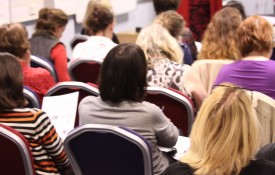| |
|

Dear Member
|
Guild Gallery May 2014
The e-newsletter for all the Dyslexia Guild Members. I hope you had a chance to book for the Dyslexia Guild Summer conference over the holiday but if not, great news, as we have extended our Early Bird rates for all you busy people! Based in Lincoln on 19 June, the conference "Dyslexia and Co-occuring Difficulties: Exploring Aspects of Performance" can be booked for £80 until midnight on 28 May, so do not delay.
The annual event for teachers, educational practitioners and Dyslexia Guild members, held on 19th June, will include presentations on dyslexia in multilingual settings, dyslexia and deaf children, hidden disabilities and access arrangements, as well as including seminars on a number of practical applications.
Keynote speakers include, Dr Deirdre Martin of the University of Birmingham, who will explore dyslexia and multilingual settings and Dr Rosalind Herman of City University London, who will present the theme of reading and dyslexia in deaf children.
Dr Martin’s presentation will delve into the increasingly diverse linguistic and literacy landscape in the UK, not least in schools, colleges and universities. In the UK we work with a diversity of spoken languages, literacy practices, digital literacies and orthographies. This presentation will review the implications for current service providers and practitioners, concerning identification and support for learners with specific learning difficulties, where English is an additional language for a learner and/or where they have dyslexia.
Dr Herman’s presentation will explore the findings from a major UK research study, which looked into reading and dyslexia in oral, speech dependent, deaf children. The presentation will highlight measures that were sensitive to reading difficulties in deaf children and describe profiles of the poorest readers. Dr Herman will then go on to discuss the significance of the findings for intervention, within this group of children.
In addition to enjoying presentations on the latest research, those attending will also be able to take part in practical seminars and workshops and network with like-minded individuals, whilst browsing the books and resources available on the exhibitions stands.
We will also be offering two CPD events on the Wednesday 18th, a Diagnostic Report Writing day for those of you wanting to apply for or renew your Assessment Practising Certificate. The other event is an afternoon seminar on Dyslexia Action Literacy Programme, an update to DILP.
More details here.
I do hope you can join us and I look forward to meeting you there.
|
Upcoming Courses
|
Postgraduate Programme
Starts 12th May 2014
The aim of these online programmes, that run three times a year, is to train teachers and support tutors to become informed, skilled practitioners who understand the theory and practice of teaching and/or assessment of dyslexic learners of all ages (we have three start dates per year in September, January and May) informed, skilled practitioners who understand the theory and practice of teaching and/or assessment of dyslexic learners of all ages (we have three start dates per year in September, January and May)
See if you are eligible for National Scholarship Funding here
Training PG Courses
CPD Programme
Short Courses starting 21 May 2014 and 9th July 20-30 hours of study over 6 weeks
Dyslexia Action's Continuing Professional Development Level 4 and 5 online courses have been designed specifically for:
Classroom Teachers 
Teaching Assistants
Tutors working with those under the age of 18
The Dyslexia Action Level 4 and 5 CPD Programme consists of independent Unit courses, most of which may be taken individually (start dates throughout the year). You can build up these units over time to gain Awards and then a Certificate (two Awards).
Our online courses offer flexible learning to fit around your lifestyle.
See if you are eligible for National Scholarship Funding here
Online Summer School

Starts 9th July 2014
These specialist e-learning courses are designed to strengthen the expertise and confidence of teachers, teaching assistants and support tutors in order to ensure the progress and achievement of children or adults with Dyslexia / SpLD. The courses aim to raise awareness of specific learning difficulties, improve the school and classroom environment and change teaching approaches. This will help teachers and teaching assistants to develop inclusive practice and strategic approaches to meet the needs of individual learners.
Dyslexia Action Headquarters are moving
We have very much enjoyed our time at Park House on the edge of Saville Gardens in Englefield Green but the Victorian building is not so good for our IT and communications infrastructure so we are moving down the hill and into Egham High Street. Victorian building is not so good for our IT and communications infrastructure so we are moving down the hill and into Egham High Street.
The HQ will be closed on Friday 23 May for moving and will reopen on Tuesday 27 May at 10 High Street, Egham, Surrey YW20 9EA but Telephone numbers will remain the same:
0300 303 8357 (Dyslexia Action House) and 0300 303 8358 (Egham Learning Centre). The Egham Centre who offer assessment and tuition support to the Surrey area will be coming with us and are to be based a few doors down in No 7, as will the Training department and the National Dyslexia Resource Centre (NDRC) library. Library visitors are still welcome, just contact the Guild to let us know you are coming.
We are looking forward to moving into the heart of the Egham community where we can become better known and more accessible.
News
Access to Education
Are you interested in doing non-commercial research? Want access to scholarly works but not sure where to go?
There is a scheme being run in public libraries called “Access to Research” where academic articles are available, free of charge, in participating public libraries across the UK. It is being run as a pilot but the more popular it is, the more likely this will be rolled out to all public libraries in the future. Users have to actually go to the public library premises to access it and it is a UK only scheme that only applies to non-commercial research.
To find out if your local public library is participating, visit the website
|
|
Disabled Student Allowance Cuts Deep
|
|
The British Assistive Technololgy Association (BATA) have said that cuts in grants will damage disabled students.
Mark McCusker, Chair of the British Assistive Technology Association (BATA) said “We all recognise the need to
 make savings, but this new approach, shifting the burden of provision from the directly funded DSAs to higher education institutions - and there has been no announcement of extra money for them - mean that able students, who happen to be disabled, from September 2015 will be at risk of finding it increasingly difficult to study successfully for degrees, with some not feeling they can even try and others finding they do less well than they should.” More here make savings, but this new approach, shifting the burden of provision from the directly funded DSAs to higher education institutions - and there has been no announcement of extra money for them - mean that able students, who happen to be disabled, from September 2015 will be at risk of finding it increasingly difficult to study successfully for degrees, with some not feeling they can even try and others finding they do less well than they should.” More here
See the Written Ministerial Statement here.
There is a petition on the recent announcement to cut the DSA (Disabled Student Allowance) here
Summer Conferences on dyslexia
19 June 2014 Dyslexia Guild conference in June, Dyslexia and Co-occurring difficulties: Exploring aspects of performance Lincoln
1 July 2014 Developing effective entrepreneurship and enterprise education, learning from dyslexia Sheffield
19 to 21 June 2014 The European Dyslexia Association (EDA) Summer Seminars which will be held from 19th to 21st of June 2014 under the topic: “Exchanging research, practice and experience” San Marino
20 September 2014 Education Conference 2014 - 'Dyslexia: Practice Makes Perfect' Falkirk
British Library Resource on the First World War
Explore online over 500 newly-digitised primary sources from across Europe in the new World War One website designed for secondary school and FE teachers and students.
Highlights include photographs from the front line, soldiers’ personal diaries, censored mail and propaganda posters.
Providing a pan-European perspective on the war, the site features teachers’ notes and articles from leading experts. Delve into the site to broaden your own subject knowledge and to plan new and engaging lessons.
The website forms part of the Library’s World War One centenary activities which also include a schools programme
|
|
Research News
|
|
|
Could video games help reading skills for those with dyslexia
Auditory processing skills and multisensory stimuli research
In addition to their trouble with reading, people with dyslexia also have greater difficulty than typical readers do when it comes to managing competing sensory cues, according to a study. The findings suggest that action video games might improve literacy skills in those with dyslexia.
"We think that people with dyslexia might learn associations between letters and their sounds faster if they first hear the sound and then see the corresponding letter or word," Vanessa Harrar of University of Oxford says. Of course, traditional approaches to reading, in which letters are first seen and then heard, do just the opposite.
Harrar's team goes on to propose a unique, nonverbal approach to improve reading and writing with action video games. "We propose that training people with dyslexia to shift attention quickly from visual to auditory stimuli and back -- such as with a video game, where attention is constantly shifting focus -- might also improve literacy. Action video games have been shown to improve multitasking skills and might also be beneficial in improving the speed with which people with dyslexia shift attention from one task, or sense, to another."
For more on this story Click Here
|
|
|
Comorbidity Reported in ADHD, Dyslexia and Autism
New studies in Pediatrics and other journals report that ADHD, Dyslexia or LD and Autism are comorbid with many other disorders and each other. In discovering the previously hidden common denominator--cerebellar dysfunction--responsible for this overlapping, Dr Levinson's research also revealed this insight provided important etiological, diagnostic and therapeutic benefit.
Two recent studies in Pediatrics have shown that ADHD is comorbid with language and anxiety disorders. Prior research has indicated that ADHD, dyslexia or LD and Autism overlap with each other as well as additional impairments involving mood, balance and coordination, etc.
For more details Click Here
|
|
1 in 5 children read on a tablet
The Childwise Monitor Report 2013-14, which surveys the media consumption of children and teens, said tablets are increasingly the device of choice and that ownership has almost doubled for the second year running. Two in five who took part in the survey said they have their own tablet.
Simon Leggett, associate research director at Childwise, said tablets are popular with young people for two reasons; portability, and the number of applications.
“A tablet doubles up for so many things,” he said. “It can be used for watching television or YouTube because the screen is a good size, but it’s also really easy to carry around.”
For more on this report, Click Here
Adult Learners' Week 14th to 20th June 2014
NIACE is asking you to inspire people to have a go at learning by getting involved in the Festival of Learning
Throughout the festival organisations across the country will offer thousands of opportunities for adults and families to learn something new and give them the chance to discover how learning can transform their lives.
The Festival of Learning kicks off in May and continues through to Adult Learners' Week (14 - 20 June).
Join the campaign for modernised UK copyright laws that affect dyslexia and education
Dyslexia Action strongly supports the draft Exceptions to Copyright regulations that were laid before parliament on March 27th 2014. We are urging MPs and Peers to support these vital changes to the UK's copyright regime.
The current situation for exceptions to having to contact and gain the copyright holders permission to copy their work is narrow. There is an exception if you are visually impaired, blind or partially sighted, cannot focus or move your eyes. It allows you to make a copy of a lawfully obtained copyright work if you make it into a format that helps you read the material or you make an accessible copy for someone else who is visually impaired.
Exceptions for people with disabilities currently does not include people with dyslexia. It needs to be amended to apply to all print disabled learners.
A number of exceptions apply to schools, universities and other educational establishments. These are Copying (but not using reprographic equipment to make multiple copies), Setting or answering exam questions, performing, Playing or showing, recording within the educational establishment for educational purposes. The problem lies in the copying exception which does not allow the change of format into a digital copy. So you could not photocopy a chapter from a book and then put that up as a pdf on a website or electronic learning device, or make multiple photocopies without either seeking the copyright holders permission or obtaining a licence from the Copyright Licencing Agency or similar body.
The Amendments to exceptions to Education needs to be made fit for the digital age, where students expect to appraise information in digital media.
Write to your MP and urge them to support the draft exceptions to copyright regulations.
Find and email your MP here
A draft letter can be found here
More details are available from the Libraries and Archives Copyright Alliance or to find out more about Copyright Law see the Intellectual Property Office website
|
|
Reading news
MacDonald's offer free children's e-book download
McDonald’s UK has teamed up with eReading provider Kobo to offer its Happy Meal customers access to free digital books. This is the latest exciting news in McDonald’s Happy Readers campaign, a long-term initiative to put millions of popular books into the hands of families and help make reading fun.
The new e-book voucher is the latest step in McDonald’s ‘Happy Readers’ campaign which has already seen two annual books promotions get millions of copies of popular children’s books into the hands of UK families and £1 book vouchers now feature prominently on the side of the Happy Meal box. The e-book voucher partnership with Kobo was negotiated by The Marketing Store as part of the evolution of Happy Readers.
The tie-up with Enid Blyton’s ‘Secret Seven’, published by Hodder Children’s Books, will be running for five weeks in McDonald’s restaurants nationwide from Wednesday 30th April to Tuesday 3rd June.
Six short stories from the author’s timeless ‘Secret Seven’ collection, featuring exclusive colour illustrations by famed illustrator Tony Ross, will be available in-store as part of the Happy Meal. Two additional ‘Secret Seven’ and ‘Famous Five’ titles will also be available to parents and children through the £1 book voucher redeemable at WHSmith or Eason and the free Kobo eBook download available at www.kobobooks.com/uk/happyreaders until Tuesday 17th June.
To find out more, please Click Here
|
Technology
Technology entrepreneurs help to transform India's fragmented education system
Raghav Gajula moved to an east Delhi slum to work as a teacher at a private school for low-income families.He lent the kids his laptop and started setting up mentoring sessions for them with his friends, via Skype. Many of the slum kids come from the Bhagwanpur Khera neighborhood where one of the main landmarks is a toxic sewage drain. Yet Gajula's idea meant they were soon scheduling their own Skype sessions with their mentors, and talking about their ambitions in the arts and sports.
Recognising the increasing importance of technology in education and employment, the Indian government has a scheme that grants every public school district, regardless of the number of schools it contains, of Rs. 5m [£49,700] every year to invest in educational technology. Districts have to submit a proposal in order to be granted the funds. The government estimates that 22% of primary schools have a computer, but the reality is that many schools aren't using the equipment they have.
More on this story here
Collecting data on students: is it useful to know which books they've read?
Student data can improve the student experience and boost retention. Universities can identify students who are not attending classes or accessing university resources and take action to remedy this. A student who is attending lectures and is provided with regular feedback is more likely to be engaged and to complete the course.
Such data can also be used to identify elements of the course that work well and to build on these for future year groups. Similarly, library services can benefit from identifying their most popular resources so that they can allocate their budget to best effect.
But is it ethical?
Read more on this story
UK is in second place among European countries and sixth overall in a global education league table
The rankings include higher education as well as international school tests - which boosted the UK's position.
Pearson chief executive John Fallon highlighted the economic importance of improving education and skills. Digital technology could play a part in sharing good ideas, but this will mean reinforcing rather than displacing the role of the teacher.
Mr Fallon says it would be a "huge mistake" to think of the role of teacher being lessened by an increasing use of technology.
Read more on this story
Work for Dyslexia Action
For job opportunities with Dyslexia Action please see our latest vacancies: Click Here
For more details about job descriptions or applications contact: recruitment@dyslexiaaction.org.uk
Next issue
The next issue of Guild Gallery will be sent out September 2014.
|
|
|
|
|
|